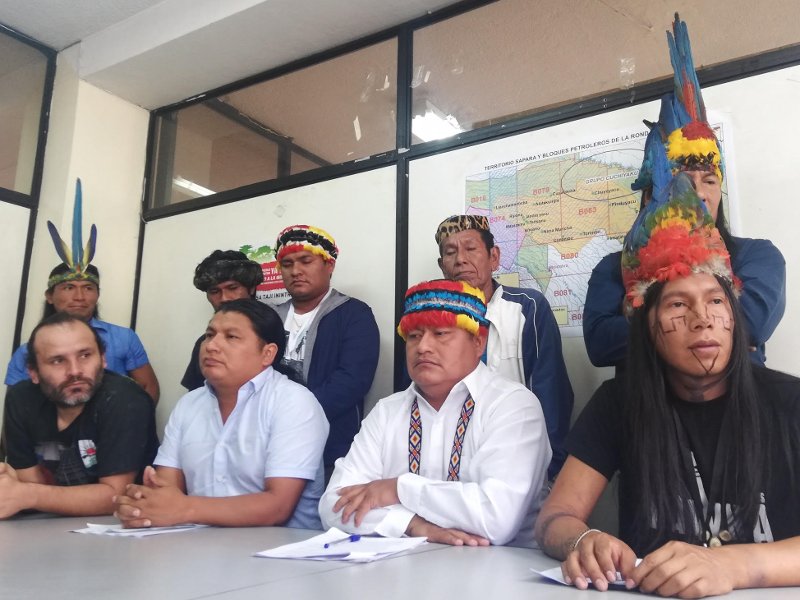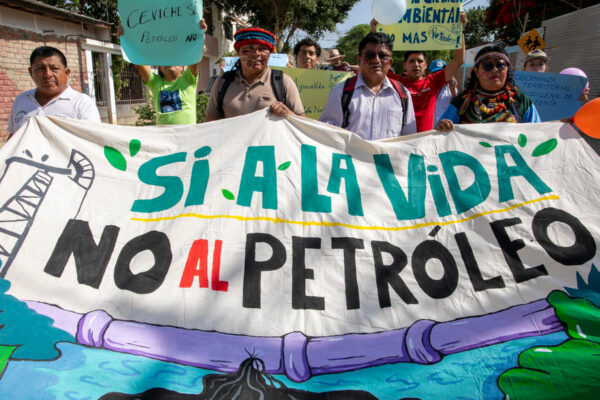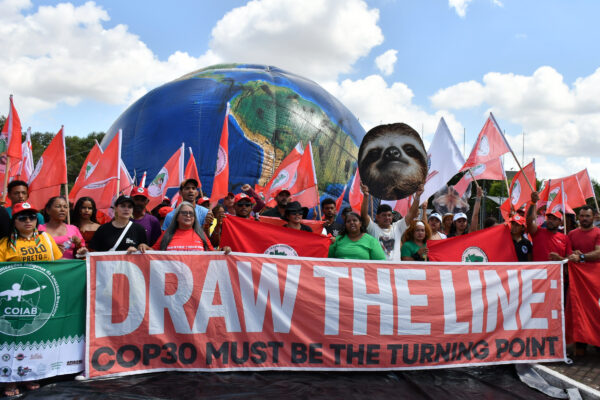
Quito, Ecuador – At a press conference in Quito this morning, indigenous representatives from Ecuador’s Amazon declared victory in a multiyear effort to stop drilling plans by Andes Petroleum in a 158,000-hectare rainforest concession known as Block 79, which overlaps the titled territory of the Sapara and Kichwa indigenous nationalities.
After more than a year of delay, Ecuador’s Ministry of Energy and Non-Renewable Natural Resources issued a resolution on October 10th, 2019 granting a force majeure request by Andes Petroleum Ltd Ecuador due to the “resistance and social and political opposition” of indigenous peoples potentially affected by the project. Today’s press conference was the first time the information has been made public.
The Sapara number some 500 people, and their communities and culture are uniquely vulnerable to the impact of oil extraction. The Sapara and their language received UNESCO designation as an Intangible Cultural Heritage of Humanity in 2001.
The decision by Andes Petroleum Ltd, a Chinese joint venture by CNPC (China National Petroleum Company) and SINOPEC (China Petroleum & Chemical Corporation) to seek the force majeure declaration comes four years into the company’s contract to conduct seismic testing and drill one wildcat exploratory well within the block. Opposition from the Sapara and Kichwa – including protests at jungle airstrips which prevented planes from accessing the remote block – along with legal action and pressure on Chinese embassies effectively prevented the company from advancing.
However, since the contract was signed in 2016, the Ecuadorian government invested significant resources to divide the Sapara and Kichwa and manufacture consent. The Ministry of Public Management, along with company community relations personnel, fanned flames of inter-family disputes and persecuted leaders for several years. The president of the Sapara received multiple death threats over their opposition to oil extraction.
“The declaration by the government of force majeure in Block 79 is a result of our fight, and it was forced to recognize that these territories are ours, we live there. We are asking the government to remove all oil concessions from our territories. We will remain vigilant,” said Yanda Montahuano, a leader of the Sapara Nation during today’s press conference.
Lineth Calapucha, Vice President of the Kichwa Nationality of Pastaza added, “We don’t want extraction in our territories, and we are demanding that the oil concessions planned for the Ronda Suroriente auction be erased from the map,” referring to the government’s plans to tender 21 oil blocks of roadless remote rainforest in Ecuador’s southeastern Amazon.
The request by Andes Petroleum cited in the Ministry resolution recognizes that there is, “radical opposition by local communities in Blocks 79 and 83 to any type of hydrocarbon activity.” A government inter-ministerial commission recommended that Andes Petroleum “not enter or conduct any activity because the position of the Sapara Nation with respect to oil activities is clear,” which paved the way for the invocation of the force majeure clause and termination of Andes’ contract for the block. A final force majeure declaration has not been determined for Block 83, an adjacent block which also overlaps Sapara and Kichwa territory.
The decision from Ecuador’s Energy Ministry comes on the heels of new momentum by the indigenous movement against extraction, attacks against indigenous earth defenders, and a global outcry over destruction of the Amazon. In Ecuador, one of the largest indigenous strikes in modern history derailed an IMF economic austerity package and the movement continues to call for an end to new oil and mining extraction. A recent court decision in the Waorani v Ecuador case determined that Ecuador’s consultation process with indigenous peoples on oil blocks slated to be tendered violated the country’s own constitution and underscored the absence of a consultation law to regulate such a process. And a recent report from the UN Special Rapporteur on Indigenous peoples found that Ecuador lacked the conditions for indigenous peoples to exert their basic right to Free, Prior Informed Consent (FPIC).
“This declaration recognizes that the government doesn’t have the capacity to apply international standards and norms regarding the rights of indigenous peoples,” said CONAIE President Jaime Vargas. “Free, prior, informed consultation and consent was not fulfilled, yet the government signed contracts for blocks 79 and 83 to an oil company. These past problems have made us declare our territory free of extractive activities. More than 40 years of oil exploitation in the north of the Amazon and oil has not brought the so-called development to Amazonian communities. In places where there are no wells, oil blocks, or road, communities are living better.”
Andes’ departure from this block is significant, given the country’s relationship with China, which is Ecuador’s largest creditor. Ecuador owes 90% of its oil production to China until 2024 as part of oil-for-cash deals between PetroChina and PetroAmazonas, Ecuador’s state-run oil firm.
“What any company interested in investing in Ecuador’s Amazon oil patch should know is that there is no social license to operate, no consultation law, and adamant opposition to new drilling. Any oil activities will likely result in rights violations, court battles, project delays, and a black eye for any company’s reputational capital. Reserves here are nothing more than stranded assets,” said Kevin Koenig, Climate and Energy Director at Amazon Watch. “Expansion of oil production and new exploration in remote rainforests is not compatible with the Paris Agreement and limiting global temperature rise to 1.5º C. Drilling for unburnable hydrocarbons beneath standing forests that play an essential role in mitigating climate change is a recipe for disaster.”













